






Cultivating growth, new opportunities and bridging the gaps
SUMMARY OF CSUCI’S INSTITUTIONAL REPORT FOR REAFFIRMATION OF ACCREDITATION
SUBMITTED FEBRUARY 2024
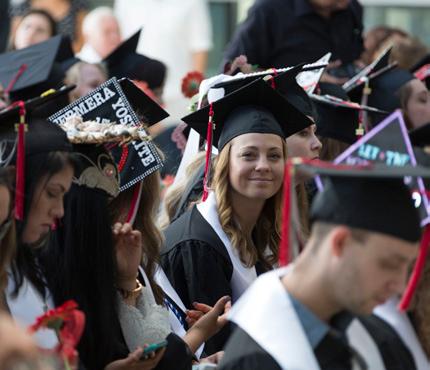


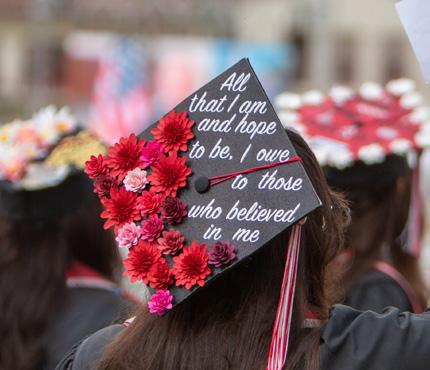
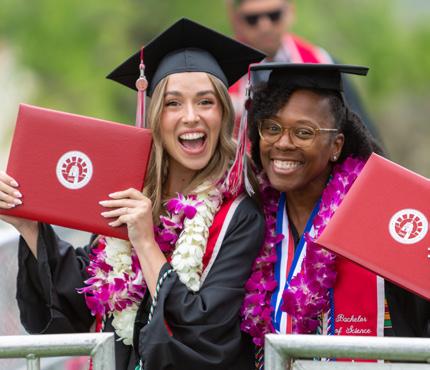
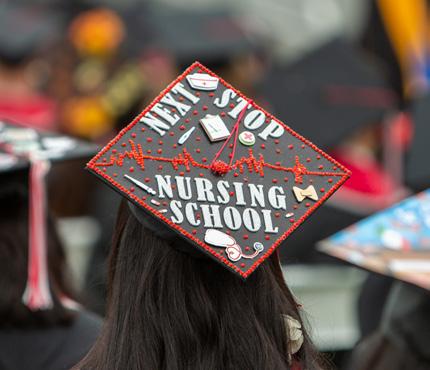
– Guided Registration
– Learning & Living-Learning Communities (L/LC) Program
– First Year Math Initiative
– Math Institute for Nurturing Developing Skills (MINDS)
– First Year Composition Initiative
– Data Champions – Academic Master Plan (AMP)
–
– New Student Onboarding
– New Student Onboarding: Summer Success Academy
– New Student Onboarding: Recruitment
– New Student Onboarding: Orientation
– Strengthening the Transfer Student Pipeline 32 DIVERSITY, EQUITY, INCLUSION, AND ACCESSIBILITY (DEIA)
– President’s Advisory Council on Inclusive Excellence (PACIE)
– Expansion of Ethnic Studies, and the Seal of Excelencia
34 THE ROAD AHEAD: OBJECTIVES FOR THE FUTURE
– Summary of CSUCI Objectives
– Objective 1: Embracing and Enhancing CSUCI’s Distinctive Identity
– Objective 2: Creating a Student Success Strategic Plan
– Objective 3: Healthier Campus Climate and Strengthening Students’ Sense of Belonging
UNIVERSITY LEADERSHIP
Richard Yao
President
Mitch Avila Provost
Eboni Ford Turnbow Vice President for Student Affairs
Richard LeRoy Vice President for University Advancement
Laurie Nichols, Associate Vice President for Administrative Services & Human Resources Office
Barbara Rex
Associate Vice President of Budgeting & Planning/ Interim Chief Financial Officer
Kaia Tollefson Chief of Staff
THEMATIC PATHWAY FOR REAFFIRMATION ADVISORY COMMITTEE
Jennifer Perry Committee Chair, formerAccreditation Liaison Officer & Executive Director of Regional Education Partnerships
Susan Andrzejewski Dean of Martin V. Smith School of Business & Economics
Emma Battles
Extended University Staff Representative
Lydia Collins Library Faculty Representative
Dennis Downey then-Associate Vice Presidnt for Academic Programs & Continuous Improvement
Marie Francois then-Director of Learning Communities Program & Professor of History
Ernesto Guerrero
Assistant Vice President for Student Success & Retention
Kristin Jordan Data Scientist
Julia Levi University Advancement Representative
Laurie Nichols
Associate Vice President for Administrative Services & Human Resources Office
Alex Padilla Office of the President Representative
Barbara Rex
Associate Vice President of Budgeting & Planning/ Interim Chief Financial Officer
Aurora Rugerio then-Associated Students Inc (ASI) Student Government President
Elizabeth Sowers Program Review Coordinator & Sociology Faculty
REAFFIRMATION STEERING COMMITTEE (RSC), CURRENT MEMBERS
Jessica Lavariega Monforti, RSC Chair, Vice Provost, & Accreditation Liaison Officer
Susan Andrzejewski Dean of the Martin V. Smith School of Business & Economics
Leo Cervantes
Interim Accounting Manager Financial Reporting/ Auxiliary Financial Services
Edna Davoudi
Administrative Analyst to the Vice Provost
William DeGraffenreid Interim Associate Vice President for Faculty Affairs Success & Equity
Ana Rosa Durán Director of Enrollment Technology & Operational Data
Eboni Ford Turnbow Vice President for Student Affairs
Jazmín Guajardo
Associated Students Inc. (ASI) Student Government Vice President
Ernesto Guerrero
Assistant Vice President for Student Success & Retention
Jaime Hannans
Associate Dean of Extended University
Michelle Hasendonckx
Assistant Vice President for Student Academic Success & Equity Initiatives
Kristin Jordan Data Scientist
Megan Kenny Feister Associate Professor of Organizational Communication
Yisel Lara
Student Representative
Jason Miller Professor & Chair of Academic Executive Senate
Daisy Navarette ASI Student Government President
Lina Neto
Associate Vice President for Academic Programs & Continuous Improvement
Monica Pereira
Head of Collection & Resource Management of Broome Library
Fernanda Ruiz Vargas Student Representative
Amber Sánchez
Senior Data & Research Analyst
Maximilian Seligman Mechatronics/Computer Science Lab Technician
Melissa Soenke
Associate Professor of Psychology
Lisbet Soriano De Jesus Student Representative
Christy Teranishi Martinez Professor of Psychology
Kaia Tollefson, Chief of Staff, Office of the President
Annie White
Associate Professor of Early Childhood Studies
Matthew Zivot
Chief Data Officer & Director of Institutional Research
REAFFIRMATION
STEERING COMMITTEE (RSC), FORMER MEMBERS
Jules Balén Director of Faculty Development & Professor of English
Blake Büller University Articulation Officer & Lead Curriculum Analyst
Roberto Bueno Lecturer of Psychology
Miguel Delgado-Helleseter Program Chair & Professor of Economics
Colleen Harris
Head of Library Instruction, Engagement & Assessment

Kathy Howard
Associate Dean of the School of Education & Director of Clinical Experiences & Partnerships
Patrick Johnson Coordinator of Residential Education
Paul Peterson Senior Data & Research Analyst
Ilien Tolteca then-President of Associated Student Inc. (ASI)
Michelle Hasendonckx (co-lead)
Assistant Vice President for Student Academic Success & Equity Initiatives
Lina Neto (co-lead)
Associate Vice President for Academic Programs & Continuous Improvement
Jaime Hannans
Associate Dean of Extended University & Digital Learning
Kathy Howard then-Associate Dean of the School of Education & Director of Clinical Experiences & Partnerships
Kristin Jordan Data Scientist
Yisel Lara Student Representative Monica Pereira Head of Collection & Resource Management of Broome Library
Annie White
Associate Professor of Early Childhood Studies
Stacey Anderson then-Chair of English
Susan Andrzejewski Dean of the Martin V. Smith School of Business & Economics
Mitch Avila Provost
Geoffrey Buhl
Chair of Mathematics
Nicholas Centino Learning Community Faculty
Tiffany Elliot Learning Community Program Coordinator
Kirk England
Assistant Vice Provost of Academic Planning & Budgeting & Chief Academic Budget Officer
Brooke Ernest
Assistant Professor of Math & First Year Math Coordinator
Colleen Forest University Registrar
Veronica Guerrero
Associate Vice President for High Impact Practices & Experiential Education
Gary Gordan
Senior Director of Housing & Residential Education
Tiina Itkonen Professor of Education & Political Science
Kathleen Klompien
Faculty Director of Learning & Living-Learning Communities Program
Sohui Lee
Associate Professor & Faculty Director of Writing & Multiliteracy Center
Susan Lefevre
Learning Community Program Faculty Lead
Brook Masters
Director of Learning Resource Center & Academic Success Services
Elizabeth Reilly Dean of the School of Education
Monica Rivas
Director of Academic Advising
Chuck Weis
Program Chair & Associate Professor of Educational Leadership, School Counseling & Psychology
PRIORITY 2
WORKING GROUP
Eboni Ford Turnbow (co-lead)
Vice President for Student Affairs
Ernesto Guerrero (co-lead)
Assistant Vice President for Student Success & Retention
Ana Rosa Durán Director of Enrollment Technology & Operational Data
Jason Miller Professor & Chair of Academic Executive Senate
Amber Sánchez Senior Data & Research Analyst
Lisbet Soriano De Jesus Student Representative
PRIORITY 2
CONSULTS
Leslie Abell
Sociology & CSUCI Initiative for Mapping Academic Success (CIMAS) Faculty lead
Mary Adler Professor of English & CIMAS Faculty Facilitator
José Alamillo, Program Chair & Professor of Chicana/o Studies
Amed Awad, Associate Professor of Chemistry & CIMAS Faculty Facilitator
Sandra Birmingham Project Director of Articulating Your Undergraduate Degree & Academic Success in STEM (AYUDAS)
Stephanie Bracamontes Assistant Vice President for Financial Services/ Controller
Toni DeBoni
Associate Vice President for Enrollment Management & Marketing
Tadashi Dozono
Assistant Professor of Education & CIMAS Faculty Facilitator
Colleen Forest University Registrar
Michael Gravagne
Assistant Vice President for Student Wellness
Georgina Guzmán
Associate Professor of English & Student Success Academy Faculty
Michelle Hasendonckx
Assistant Vice President for Student Academic Success, Equity Initiatives & Inclusion
Tatiana Juarez
STEM Transfer Success Outreach Coordinator
Kimme Kee-Rose
Department Chair & Professor of Psychology
Lina Neto
Associate Vice President for Academic Programs & Continuous Improvement
Mónica Ocampo Project Director of Channel Your Success
Lorna Profant
Biology & Student Success Academy Faculty
Mari Riojas-Cortez
Program Chair & Professor of Early Childhood Studies
Monica Rivas
Director of Academic Advising
Ariana Robles
Director of Orientation & Engagement Programs
Julia Rose
Associate Director of Basic Needs
Emily Spitler-Lawson
English & Student Success Academy Faculty
Venus Tamayo
Associate Director of Educational Opportunity Program (EOP) & Academic Advising
PRIORITY 3
WORKING GROUP
Kaia Tollefson (lead) Chief of Staff, Office of the President
Fernanda Ruiz Vargas
Student Representative
Melissa Soenke Associate Professor of Psychology
Christy Teranishi Martinez Professor of Psychology
Matthew Zivot Chief Data Officer & Director of Institutional Research
CONSULTS
Mitch Avila Provost
Raquel Baker Assistant Professor of English & Chair of Black Studies
Karina Chavarria Assistant Professor of Sociology & Co-Chair Ethnic Studies Council
LaSonya Davis Program Chair, Professor of Nursing, & President’s Advisory Council on Inclusive Excellence (PACIE) member
Michelle Dean Associate Professor of Education & PACIE member
Tadashi Dozono
Assistant Professor of Teacher Education & Co-Chair Ethnic Studies Council
Megan Eberhart
Learning Design Lead, Teaching & Learning Innovation
Eboni Ford Turnbow Vice President for Student Affairs
Lorna Gonzalez
Director of Digital Learning, Teaching & Learning Innovation
Ernesto Guerrero
Assistant Vice President for Student Success & Retention
Michelle Hasendonckx
Assistant Vice President for Student Academic Success & Equity Initiatives
HyeSun Lee
Associate Professor of Psychology & PACIE Member
Danna Lomax
Teacher Education Faculty
Alex Padilla
Executive Assistant for the Office of the President
Richard Yao President
INSTITUTIONAL REPORT AUTHORS
Jessica Lavariega Monfort
Vice Provost & Accreditation Liaison Officer
Edna Davoudi
Administrative Analyst for the Vice Provost
Michelle Hasendonckx
Assistant Vice President for Student Academic Success & Equity Initiatives
Megan Kenny-Feister
Associate Professor of Organizational Communication
Many thanks to Dr. Sohui Lee for her technical editing of the report.

Established in 2002, California State University Channel Islands (CSUCI) is the youngest institution in the California State University system. CSUCI is the only public four-year university in Ventura County and offers substantial economic and fiscal benefits to its surrounding communities.
OFFERING SMALL CLASS SIZES, CSUCI HAS:
18:1 Studentto-Faculty Ratio
29 Undergraduate Majors
6 Master’s Programs
3 New Graduate Programs launching in AY2024
FALL 2023 STUDENT POPULATION DEMOGRAPHICS
CSUCI ’s average student population, 55% transfer students
60+ 63+48+55+
REPRESENTED GROUPS (HUG)
FALL 2023 FULL-TIME ENROLLMENT BY SCHOOL
Undergraduates
Enrolled in The School of Arts & Sciences
Rnrolled in The Martin V. Smith School of Business & Economics
Enrolled in the School of Education
Placing students at the center of the educational experience, CSUCI provides undergraduate and graduate education that facilitates learning within and across disciplines through integrative approaches, emphasizes experiential and service learning, and graduate students with multicultural and international perspectives.
CSUCI was designated as a Hispanic Serving Institution in 2010 and received the Seal of Excelencia in 2019 for our high level of commitment to successfully serving LatinX students. CSUCI was one of only nine institutions in the nation and the only California institution of higher education to receive the Seal in the award’s inaugural year. In September 2022, CSUCI was the only California institution of higher education to be recertified with the Seal of Excelencia.
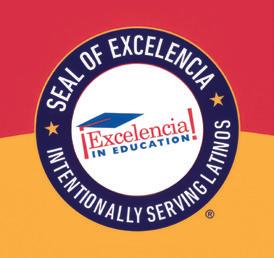
Shifting Demographics – Becoming more Latino, Female and Pell Grant Eligible Over Time
Four of CSUCI’s initiatives have been named as “Examples of Excelencia Programs to Watch”
1 2 3 4
CHANNEL YOUR SUCCESS: UNIVERSITY CULTURES PATHWAYS
PROJECT ALIGNING LEARNING & ACADEMIC SUCCESS
STUDENT SUCCESS WORKSHOPS
CSUCI INITIATIVE FOR MAPPING ACADEMIC SUCCESS
Provides culturally relevant university programs to support Latinx and first-generation college students, connecting them with peer mentors from CSUCI’s Peer Education & Equity Programs (PEEP).
Created clear pathways and smooth transitions from the county’s two-year community college programs to a four-year degree at CSUCI.
A partnership between the Sociology program and Academic Advising which creates semester-long workshops focused on academic skill building and institutional navigation mandatory for all students who earned D/F grades in Sociology classes, or were on probation or disqualified.
The CSUCI Initiative for Mapping Academic Success (CIMAS) is a cohortbased student success program that recruits students who experienced negative course outcomes in the prior semester (non-passing grades, incomplete, course drops, term withdrawal). It is designed to develop students’ academic skill sets while building critical affective assets, including a sense of academic efficacy and motivation, and increased sense of belonging.
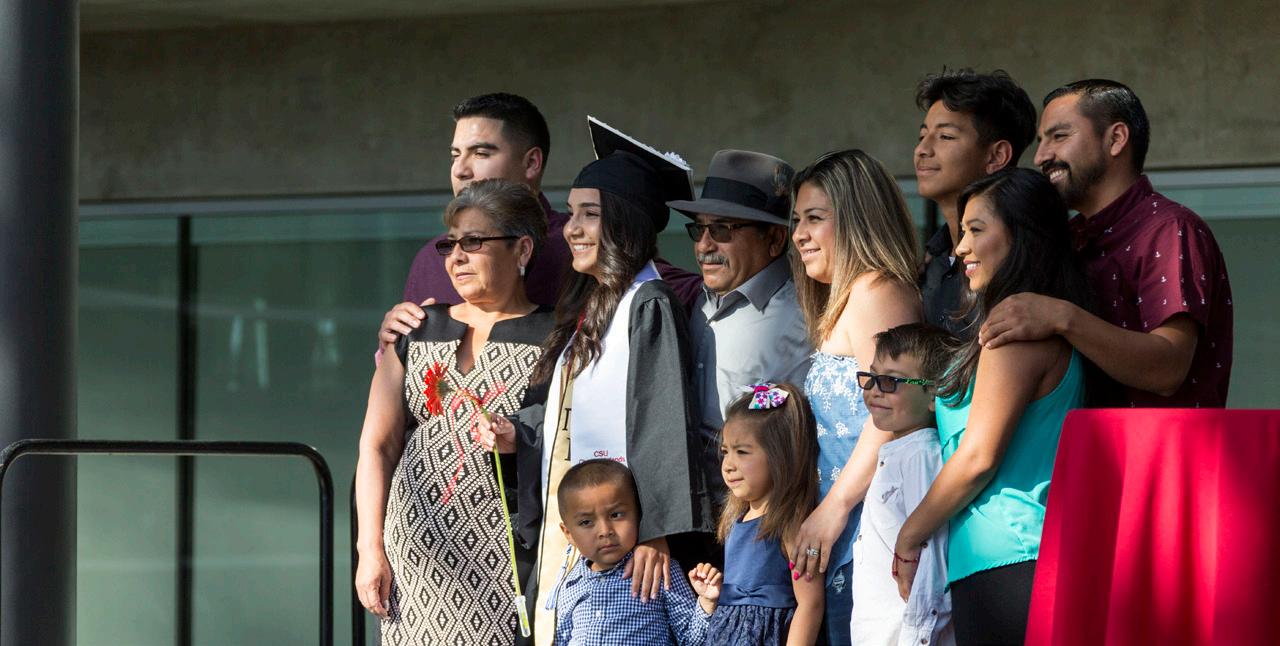
NATIONALLY RECOGNIZED FOR SOCIAL MOBILITY
CSUCI has been nationally recognized for its contribution to social mobility.
Most recently, CollegeNET ranked CSUCI 13th out of 1,198 universities in the nation for its ability to increase students’ social mobility; MONEY Magazine ranked CSUCI 4th “Best College for Transfer Students;” and Washington Monthly ranked CSUCI 17th for “Best Bang for the Buck – West” for providing its students with an affordable and valuable education.
COLLEGENET
13th of 1,198 ...for [the] ability to increase students’ social mobility
MONEY MAGAZINE
4th Best College for Transfer Students
WASHINGTON MONTHLY
” Best Bank for the Buck – West” Best College for Transfer Students




The mass shooting at the Borderline Bar & Grill in Thousand Oaks on November 7, 2018 impacted the campus community deeply. Over 50 CSUCI students were in attendance that evening. Fortunately, none were physically harmed. but many needed continued counseling and emotional support.
The region has experienced numerous wildfires and mud flows that destroyed homes and businesses, forced several campus evacuations and displaced some members of the campus community. CSUCI created support systems for displaced campus members and redoubled efforts to study and support fire mitigation and science to help prepare for the future.
The aftermath of the George Floyd murder sparked conversations and efforts on campus to affect systemic change.
The COVID-19 pandemic pushed CSUCI to create new educational models to help students stay on track toward degree completion. The University worked with both existing campus and community resources to provide basic needs, food distribution, hot spots and technology loans, and longterm support structures.
Every aspect of the region, including the economy, healthcare system, K-12 educational system, housing, agriculture, and tourism have been markedly impacted by these crises. They strengthened the CSUCI community and pushed it to create new, innovative ways to support students, staff, and faculty.

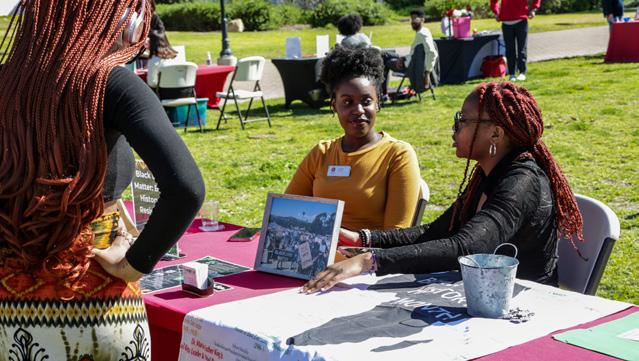

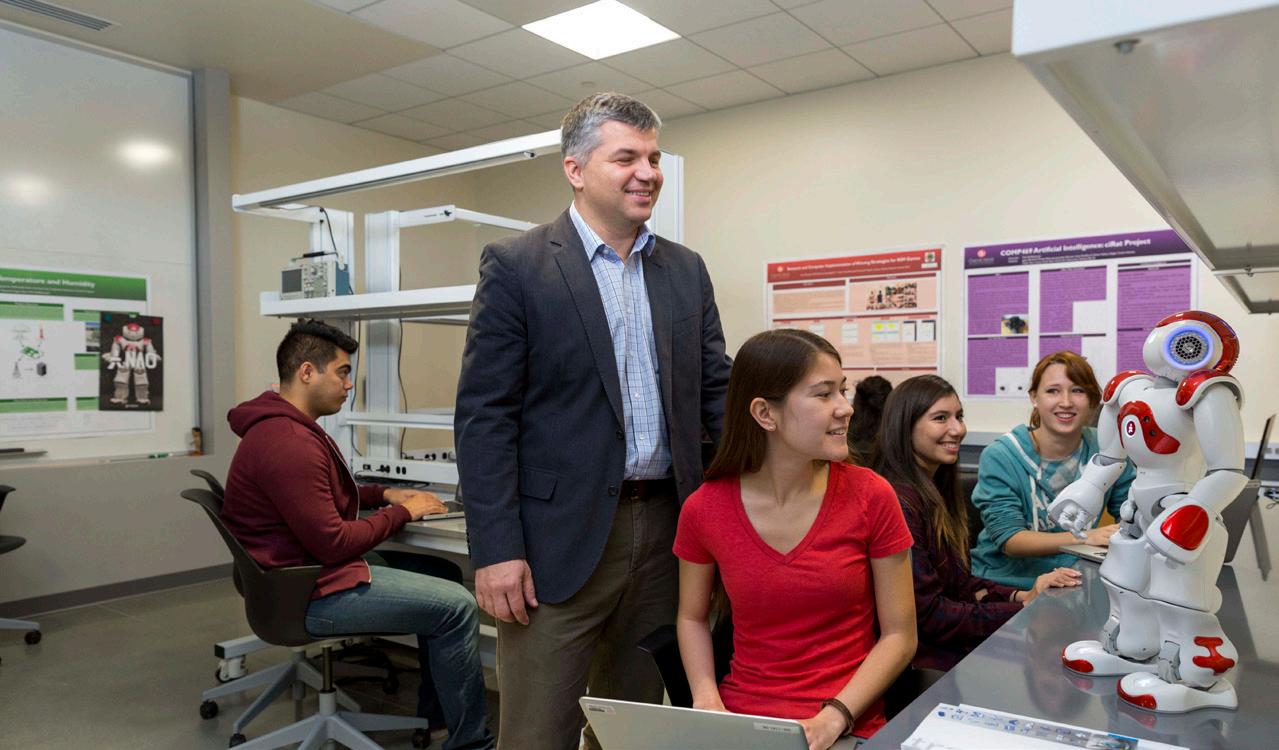
In the face of these crises and challenges, CSUCI launched a Mechatronics Engineering and a Nursing program, was awarded accreditation by the Accreditation Council for Business Schools and Programs, and continued to move the needle on social mobility for students. CSUCI was recognized as a national model for Latino student success, progressed in diversity, equity,
Peer Education and Equity Programs (PEEP) at CSUCI is a collective of peer mentor programs aimed at assisting students in navigating the college transition, fostering a sense of belonging, promoting engagement in campus culture, empowering peers to use campus resources, and building peer networks. Students are employed as peer mentors and receive a stipend to help offset their expenses with the goal of reducing their need to seek outside employment, thereby freeing up their time to serve in this role.
PEEP focuses on training peer mentors through a specialized curriculum built around 13 leadership competencies.
PEEP focuses on training peer mentors through a specialized curriculum built around 13 leadership competencies. A hallmark of the PEEP experience is the specialized training curriculum covering High Impact Engagement Techniques, Equity & Inclusive Excellence, Facilitation Skills, and Community Building. PEEP peer mentors spend over 30 hours in core training and individual program areas to ensure readiness for the academic semester. Ongoing training throughout the year encompasses specific roles and program requirements, enhancing skills in peer mentoring and outreach. This comprehensive approach ensures that PEEPs are well-prepared to contribute to the academic success and retention of their peers.
Traditionally seen as a way for institutions to help students alleviate some of the financial demands placed on them, on-campus student employment has several additional benefits the institution can leverage to assist students along their collegiate journey. The valuable skills acquired through PEEP have had a positive impact on peer mentors’ success beyond their time at the University. In a study focusing on embedded peer mentors (EPMs) in the Living Communities/ Living and Living & Learning Communities (L/LC) program, 40% of PEEP peer mentors served as EPMs. The research examined outcomes for former EPMs, specifically those who graduated since the program began in 2011 and supported students in L/LCs between academic years 2011-12 and 2022-23. Of the 63 EPMs who supported L/LC cohorts, post-baccalaureate study or employment information is available for 54. At least half of these former EPMs have either completed a post-baccalaureate degree or are in graduate school, with a focus on Master’s level programs. Moreover, at least 73% of the 63 L/LC EPMs are employed, with Education and Health Care being the leading sectors.
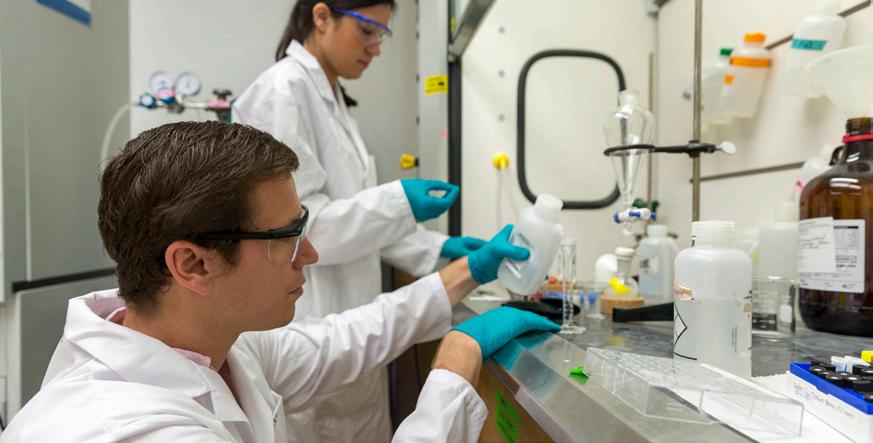
This data suggests that the EPM program within PEEP has had a significant impact on the post-graduation success of students who worked as instructional student assistants supporting students in L/LCs and beyond. The base PEEP training and leadership competencies allow for the development of targeted peer-led interventions to support a variety of student needs.
The ASSET Scholars Program aims to increase student engagement and connection to CSUCI in the first year. Using a student success team approach consisting of faculty, staff, and peer mentors, the ASSET Scholars Program brings together specialized knowledge to provide academic success and campus connection to first-year, first-generation, and undeclared students.
A peer-led communication strategy that promotes co-curricular engagement opportunities by delivering culturally-relevant strategic communications that increase student engagement. The initial method of communication is the artificial chatbot, Ekhobot, backed by student-crafted messaging and direct peer mentor follow up to address individual student needs.
EPMs support the academic success of students enrolled in courses that anchor Learning & Living-Learning Communities and transfer transition courses, as well as their success in navigating university life outside of the classroom. Each EPM is assigned to support a specific course section in a given semester and will facilitate small learning communities outside of the classroom.
The base PEEP training and leadership competencies allow for the development of targeted peerled interventions to support a variety of student needs.
EPMs support the academic success of students enrolled in courses that anchor Learning & LivingLearning Communities and transfer transition courses, as well as their success in navigating university life outside of the classroom.
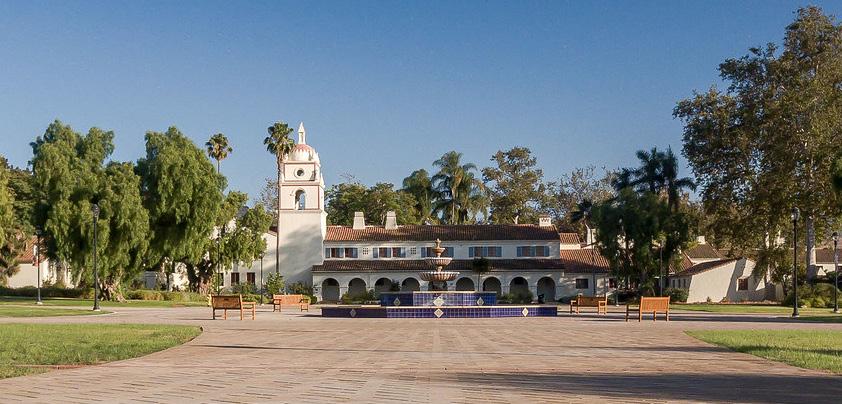
PANDEMIC ASSISTANCE PROVIDED FREE OF CHARGE TO STUDENTS INCLUDED:
Lists of community resources to help students needing support
Mobile Learning Technology
209 hotspots with data plans
187 long-term and short-term loan laptops
More than 3,400 video links made available
Saved students $326,555 in course material costs by providing access to 2,000 print books to nearly 750 classes. The Broome Library continues this practice and during the last academic year, laptops and hotspots circulated over 1,900 times.
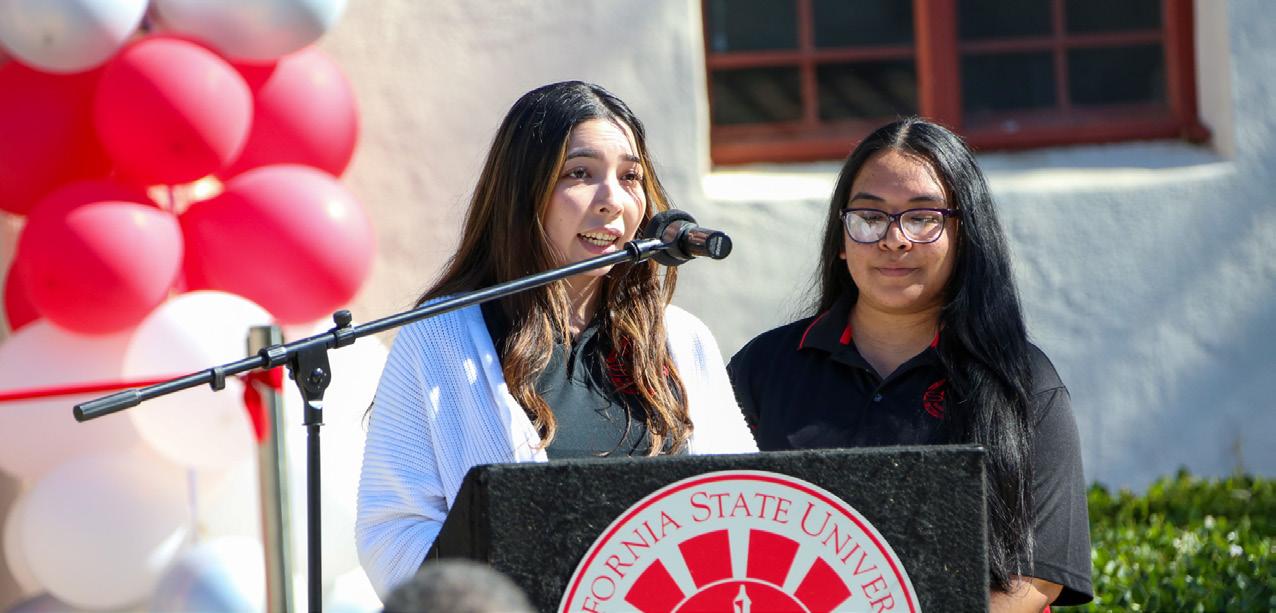
ACADEMIC SENATE LEADERSHIP
Academic Senate leadership is intentionally building necessary infrastructure for success, including archiving meeting minutes, processing Senate work through the shared governance process, and working through questions about technology and representation, including from staff members.
CSUCI STAFF COUNCIL
STUDENT GOVERNMENT
CSUCI Staff Council was created in March 2016 and each founding member was elected by fellow peers from their respective division. The goal is to connect staff to the rest of campus as well as address issues and continue to build onto the campus culture for the betterment of the campus community, with the primary focus of supporting staff in their roles.
Student government is the recognized representative voice of the CSUCI student body. Associated Students Incorporated (ASI), established shortly after the university opened its doors, seeks to effectively communicate, create, and maintain community, as well as provide and support co-curricular learning. ASI has an active membership in the California State Student Association, which is recognized as the single recognized voice of all CSU system students.
CSUCI experienced steadily increasing enrollment through academic year 20192020. Prior to the COVID-19 pandemic, CSUCI exceeded its state-funded enrollment targets. Post-pandemic, however, these trends were quickly reversed.
● Hiring a new Director of Admissions & Recruitment
● Creating a new Institutional Research Office under a new Chief Data Officer
● Contracting with a highly regarded consulting firm, Best Practice Solutions, to evaluate organizational structures, operations, and retention efforts, while actively consulting on admissions and recruitment for Fall 2024 and 2025 cohorts. This work involves building the technical infrastructure to ensure access to real-time enrollment data to assess and inform CSUCI’s progress.
● Creating a new strategic Integrated Marketing Communication Plan to develop CSUCI’s brand foundations, unique brand promise, assets, and character. These will be integral in creating new brand visuals and for the University’s website redesign.
● The development of concurrent enrollment strategies that will lead to projected growth by academic year 2025-26. CSUCI hit its budgeted planning enrollment projections for Fall 2023; projections indicate enrollment stabilization in academic year 2024-2025, and an upward trajectory is anticipated once again beginning in the 2025-2026 academic year.
The development of concurrent enrollment strategies that will lead to projected growth by academic year 2025-26.
● In 2023, the University saw a 27% decrease in FTE Students (full time equivalent) since 2019-2020. Therefore, the University is facing a projected $7 million cumulative cut over three years to its permanent general fund allocation by 2026-2027, and its current tuition revenue is $9 million below where it was pre-pandemic.
As enrollment management has emerged as the top priority for the immediate, intermediate, and long-term planning for the University, CSUCI is addressing enrollment recovery through a multi-year lens. There is much within CSUCI’s control that will improve enrollment.
CSUCI’s new Academic Master Plan (AMP) approved by the CSU Board of Trustees since Spring of 2023 offers 24 new degrees.
● The new degrees were created in response to regional workforce needs, faculty ideas for new programs, academic structures and policies, revisiting the University’s mission, and defining the distinctive features and value of a CSUCI education.
● The Academic Master Plan serves as the foundation for long-term, strategic enrollment growth, rooted first and foremost in the strength of existing academic programs, the University’s ability to serve the regional workforce and service needs, and strong post-graduate outcomes for our students
● Campus leadership recognizes tensions between expanding academic programs while navigating tuition revenue deficits, enrollment challenges, and the associated projected appropriation cuts. To address this, CSUCI has developed a cost model for new academic programs. The cost model is one aspect of the prioritization criteria, not the only factor, that will be utilized to prioritize new programs. President Richard Yao has set aside $10 million of CSUCI’s recent gift of $15 million from philanthropist Mackenzie Scott to support the phasing of the Academic Master Plan implementation.
● Additional considerations informing the expansion of academic programs include projections for enrollment growth, existing faculty and staff capacity, the degree of alignment with regional needs, and alignment with the organizing concepts of CSUCI’s vision for its future.
● The Academic Master Plan has set the stage for the next iteration of a place based strategic plan grounded by our commitment to the environmental and wellness of our region–one of the most resource and culturally-rich regional environments in the nation. The emerging strategic plan combines our strengths in providing liberal arts education and experiential, career-oriented academic programs while at the same time intentionally focusing on distinctive aspects of our campus and region.
24 NEW DEGREES
President Richard Yao has set aside $10 million of CSUCI’s recent gift of $15 million from philanthropist Mackenzie Scott to support the phasing of the Academic Master Plan implementation.
12 BACHELORS DEGREES
10 MASTERS DEGREES
2 DOCTORAL -LEVEL DEGREES
Gaps & Ladders or Brechas y Escaleras is CSUCI’s bilingual accreditation theme. There are three priorities within this theme:
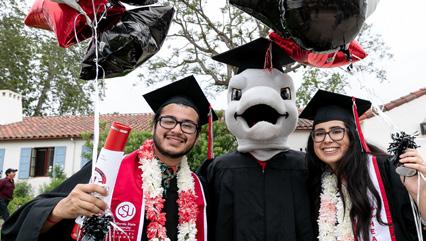
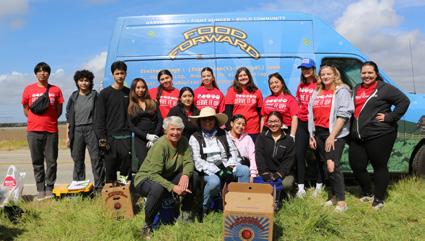

ACADEMIC QUALITY AND STUDENT-CENTERED INFRASTRUCTURE
EXTENDING
PROFICIENT
STUDENT SERVICES, SUPPORT AND DEVELOPMENT
1 2 3
DIVERSITY, EQUITY, INCLUSION AND ACCESSIBILITY (DEIA)
The theme is centered on a Student Success Framework. The framework indicates that students are empowered to:
Identify and accomplish their educational goals.
Develop skills to positively contribute to their futures, along with that of their families and their diverse communities, through high impact practices and experiential learning opportunities.
Engage in enrichment activities that further develop their whole self.
Prepare for post-graduate life by gaining knowledge, skills, and experiences necessary for engaged citizenship and career success.
Student success has been central to CSUCI’s strategic planning and continues to guide decisions.
In 2015, the CSU launched Graduation Initiative 2025, its ambitious plan to focus on student success through increasing graduation rates, eliminating equity gaps in degree completion and meeting California’s workforce needs. The next step is the development of a student success strategic plan that will dig into the details of the framework, set benchmarks and methodologies for data collection and measurement, and outline needed resources.
CSUCI has created multiple initiatives that increase the quality of academic offerings, strengthen student-centered infrastructure by removing administrative barriers, and create initiatives that enhance both quality and infrastructure while addressing the rates of students who earn a D or F, withdraw from classes or take an incomplete (DFWI). Guided registration, block scheduling, embedding peer educators in first year math, and the like.
Lower than desired retention & graduation rates for first-time, full-time students, particularly those from historically underserved groups (HUGS).
Lower than average unit attempts per semester by undergraduate students CSUCI fully implemented a guided registration process to support first year student success through increasing attempted units, completing required math and composition courses, and supporting undeclared students to develop a pathway towards general education completion.
Guided Registration Digital Degree Planner Learning & Living Learning Communities expansion
High DFW rates, particularly in First Year Math and First Year Writing First Year Math Initiative, including Math MINDS First Year Composition Initiative Data Champions program
CSUCI fully implemented a guided registration process to support first year student success through increasing attempted units, completing required math and composition courses, and supporting undeclared students to develop a pathway towards general education completion. Major wins throughout this work included expanding shared governance across four of five divisions at CSUCI, improving the predictability of first year course demand, and improving compliance with Executive Order (EO) 1110 regarding general education quantitative and composition requirements.
Results from these block scheduling efforts were strong. In comparison to other students, new first-time, full-time (FTFT) students generally enrolled in a higher number of units in 2018 and beyond.
Learning & Living-Learning Communities offer students an opportunity to connect with other students of similar backgrounds or who share their academic interests by creating a cohort of students. The cohorts take three courses a year together.
Living-Learning Communities provide an additional opportunity for students to live together on the same floor of student housing and participate in activities outside of classroom instruction centered around the theme of their community.
These communities also have peer mentors embedded in their courses and help students transition to University life by holding events, connecting students to campus resources, and acting as a mentor and role model.
The Learning & Living-Learning Communities program has grown considerably since this high-impact practice was instituted more than a decade ago. In 2021, 25% of CSUCI full-time, first-year students were enrolled in a learning community, almost doubling from the 13% enrolled in 2011. In Fall 2023, that percentage roughly tripled, with 84% of first-time, full-year students enrolled.
CSUCI students can participate in 17 unique learning communities, six of which are living-learning communities, and six of which focus on issues of identity, culture, and diversity.
CSUCI students can participate in 17 unique learning communities, six of which are living-learning communities, and six of which focus on issues of identity, culture, and diversity.
In Fall 2022, L/LCs served more students from demographic groups that have been historically underserved by institutions of higher education, including more historically underrepresented minority groups, Pell-eligible students, and students who have the opportunity to be the first in their family to graduate from a fouryear college or university than the overall First-Time/Full-Time (FTFT) population at CSUCI.
Nearly all (88%) Black/African American FTFT students participated in L/LCs. Descriptive statistics show that Fall 2022 FTFT students who participated in L/LCs had better first-term and first-year outcomes than non-L/LC participating peers. For most measures of academic success, the benefit of L/LC participation was greater for students from historically underserved groups. L/LC participation is significantly associated with: higher probability of achieving sophomore status by the start of the second year, increased units attempted and completed in the first term and first year, higher first-term and first-year GPA, lower number of DFWI grades in the first term, higher probability of being in
good academic standing at the end of the first term and first year, higher probability of meeting with a staff academic advisor in the first year, and increased completion rates of the Golden Four GE requirements – Oral Communication, English Writing, Critical Thinking, and Mathematics/Quantitative Reasoning – within the first year.
In Spring 2023, CSUCI’s Institutional Research office generated a report that gathered ten years of data on learning and living-learning communities from Fall 2011 to Fall 2021. This report found:
● Students who participate in an L/LC are 5-6% more likely to graduate than those students who do not.
● L/LC participation was also associated with a 3-4 percentage point improvement in one-year retention for the Fall 2011-2021 FTFT cohorts and had a higher GPA in their first semesters (2.87) than students not enrolled in a learning community (2.69) over the decade of the analysis.
● Of students enrolled in learning communities in 2020-2021:
– 68% were from underrepresented minority groups
– 45% were first-generation college students
– 50% were Pell-eligible
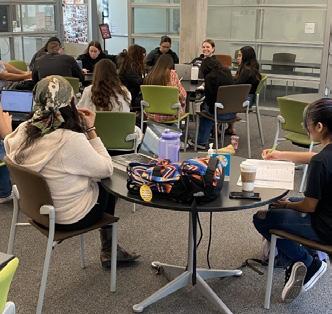
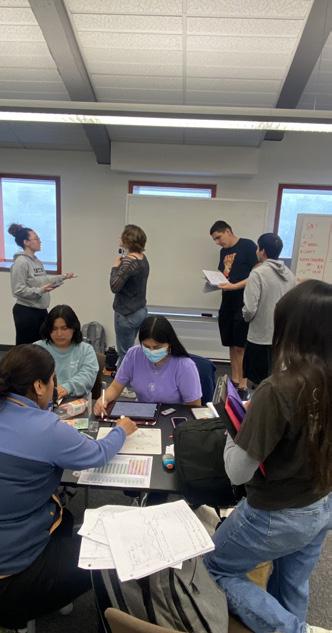


CSUCI’s First Year Math (FYM) initiative focuses on enrolling and supporting students to successfully complete the quantitative reasoning requirement within the CSU’s General Education structure. Key components of this success include improved placement through Math MINDS, embedded tutors in quantitative reasoning courses, and the introduction of a FYM coordinator role.
First Year Math initiative key takeaways include:
1 2 3 4 5
Completion of B4 courses predicts high retention rates; unsuccessful attempts are associated with lower retention, particularly for certain student groups.
About 96% who completed the requirement in their first term are retained from Fall to Spring.
About 87% of Fall 2022 FTFT freshmen attempted a B4 course in their first year compared to 91-95% for previous cohorts.
Just 58% of Fall 2022 FTFT freshmen completed a B4 course in their first year compared to 71% to 81% for previous cohorts.
First Year Math interventions, such as visiting the Learning Resource Center, having an Embedded Peer Tutor, and participating in the Math MINDS program, are associated with higher pass rates in B4 math courses for all students.
The Learning Resource Center’s Math MINDS program, established in Fall 2022, addresses challenges faced by students identified as most vulnerable based on their incoming math skills. The program aims to enhance students’ self-beliefs, dispel math-related myths, and provide academic success behaviors and strategies applicable to all higher education pursuits.
Students who completed the Math MINDS program elements show a higher persistence rate (93%) than all other students (87.5%). These completers were also more likely to pass their first year math (B4) course (71.4% vs. 63.7%). Students reported increased self-belief, growth mindset adoption, coping skills for math anxiety, help-seeking behavior, use of SMART Goals, time management strategies, effective learning strategies, and a sense of community and belonging
About 96% who completed the requirement in their first term are retained from Fall to Spring.
Students who completed the Math MINDS program elements shows are higher persistence rate (93%) than all other students (87.5%).
Because writing is required in many first-year courses, the WMC strategically supported first year students in courses in and outside composition to reinforce their writing habits and skills.
at CSUCI. Overall, studetns who completed the Math MINDS program demonstrated higher pass rates, mean semester GPA, and retention rates compared to students not in the program during academic year 2022-2023, indicating promising results despite the small sample.
The Writing & Multiliteracy Center (WMC) at CSUCI aims to promote a culture of writing and communicative arts through various initiatives, including embedded peer mentors, tutoring, workshops, faculty consultations, web resources, and interdisciplinary programs like Plot-A-Thon. Embedded tutoring in writing improves pass rates, supports first-year student success, and increases WMC visits. Students in embedded courses who visited the WMC had higher pass rates by 20 percentage points.
Because writing is required in many first-year courses, the WMC strategically supported first year students in courses in and outside composition to reinforce their writing habits and skills. Overall, CSUCI’s composition completion rate in Fall 2022 dropped 2 percentage points when compared to Fall 2021; however, a closer look reveals that students who were in embedded composition courses and visited the WMC for tutorial visits were more likely to pass than students who were not in embedded composition courses and did not visit the WMC for tutorial visits.
In addition to embedded tutors, using the services of the Learning Resource Center and WMC have a positive impact on retention. Data reveals a higher retention rate for students who visit either center with the greatest benefits occurring for the HUG student population.
In Spring 2022, CSUCI created a more intensive and supportive academic program review initiative called “Data Champions’’ that provided six faculty from academic programs in their self-study year with four, two-hour workshops as well as individual support by Institutional Research (IR) analysts. Two dashboards were built to capture Student Equity Analytics (SEA) and explore equity gaps across a variety of student characteristics.
To better support institutional research and a culture of continuous improvement, IR partnered with the Student Academic Success & Equity Initiatives office (SASEI) to support the Data Champions. Data Champions will work closely with IR to access, understand, and present institutional data such as DFWI rates and equity
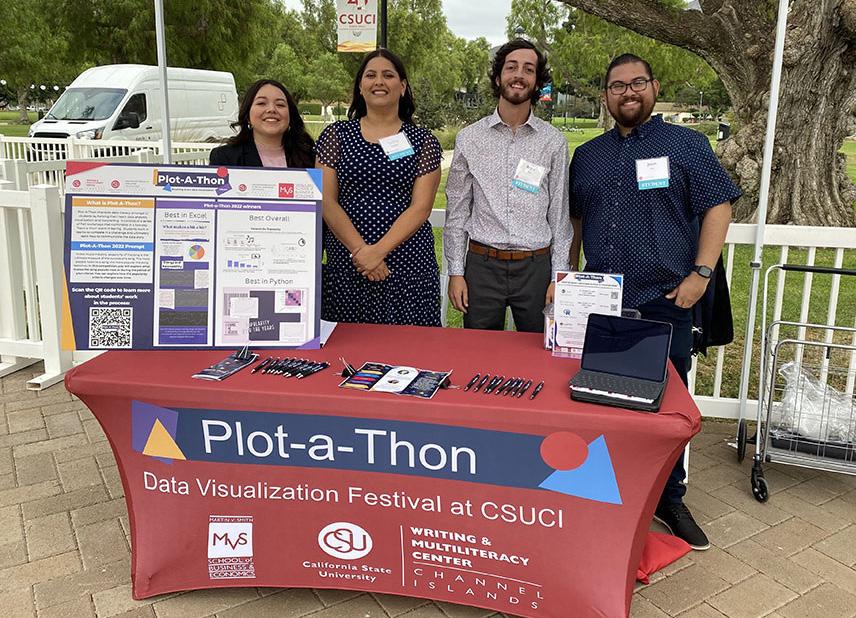
gaps, as well as strategize ways to communicate findings and recommendations back to the campus. IR also created a web-based resource to help faculty explore equity gaps in their courses and address them with research-based pedagogical techniques to improve student success.
The CSU Board of Trustees approved 24 new undergraduate and graduate programs. Programs were created to align with the needs of the community we serve at a regional and state level. Academic leadership worked with faculty to grow the program offerings in alignment with the needs of the region and the state, conducive to social mobility of the regional community. Once the AMP is implemented, blended programs also known as “4+1 programs” will be created between undergraduate and graduate programs, allowing students to graduate with a baccalaureate and a masters in five years.
The CSU Board of Trustees approved 24 new undergraduate and graduate programs.
CSUCI has implemented several student support initiatives to prioritize student retention and success, such as:
● Providing two- and four-year academic roadmaps and a digital degree planner: Two tools have been shown to improve CSUCI students’ time to degree completion in higher education: the use of academic pathways, or roadmaps, and degree planners. By using a roadmap along with a degree audit, students have the ability to plan timely progress toward their academic goals. Digital Degree Planner is an interactive tool that allows students to plan courses for future semesters and ultimately, degree completion. The tool helps students view recommended course sequences for their academic program (general education, major, and minor categories) and identifies prerequisites and corequisites.
These changes led to a dramatic reduction in the number of students subjected to disenrollment, from 1,200 to approximately 400 students.
● Removing administrative barriers for low-income and first-generation students: CSUCI now serves as a model for other CSUs for re-engaging and re-enrolling students who had their degree progress interrupted. Since 2015, CSUCI has reviewed and simplified student-facing administrative processes associated with business operations. Also, each fall, CSUCI conducts a Stop Out Survey and offers peer mentoring targeting students who were new freshmen or new transfers the previous year but did not return for the following Fall semester. CSUCI partnered with Inside Track for re-enrollment coaching to reach out to students who previously stopped out and to mitigate disenrollment due to debt or enrollment holds. Further, modifications to the disenrollment operation were implemented including embedding outreach activities in the disenrollment process, developing a student business messaging plan, and increasing cancellation from $600 to $1,000. CSUCI made significant changes to disenrollment practices related to non-payment, reducing the number of payment and disenrollment dates from four to two and being more proactive with student-facing communications. These changes led to a dramatic reduction in the number of students subjected to disenrollment, from 1,200 to approximately 400 students.
● Expanding basic needs services to address out-of-classroom factors impacting academic functioning, such as food and housing insecurity. Students can receive emergency food and toiletries, connections to on and offcampus resources, and educational opportunities for personal responsibility in wellness.
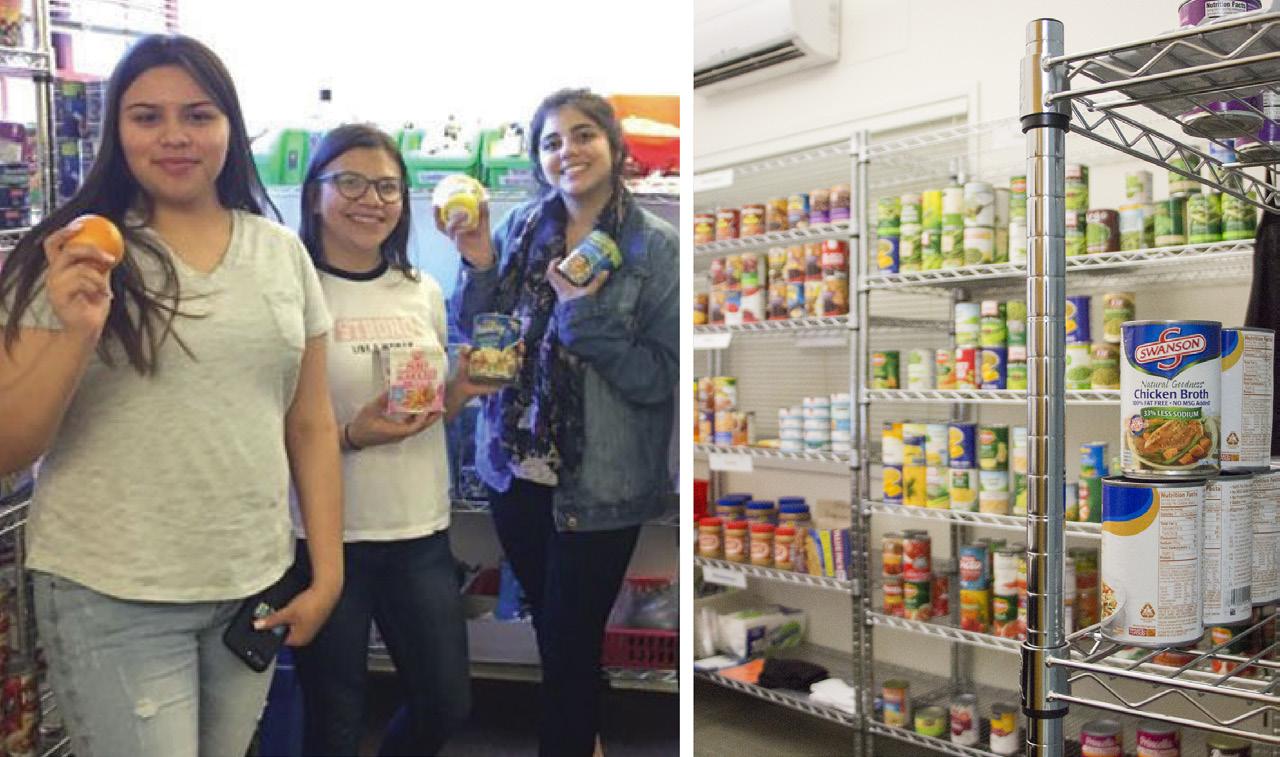
● The Basic Needs program also addresses housing challenges through oncampus emergency housing, in collaboration with Housing and Residential Education. Students aged 18-24 can also receive grants for emergency housing until 2027.
● Students can now access CalFresh through campus payment systems.
● Students can receive push notifications within the goCI app called the Ekho Bites Food Alert Program. This program allows students to sign up to receive alerts from Campus Events when prepared food is available at the end of scheduled campus activities/events.
● In partnership with the United Way, CSUCI is offering the Volunteer Income Tax Assistance (VITA) Program. This program supports individuals who make under $60,000 annually, individuals with a disability, individuals with limited ability to speak English, and/or individuals over the age of 60. Basic Needs will assist with marketing and intake related to the program, while the VITA program will train and assign volunteer tax preparers to the campus.
In partnership with the United Way, CSUCI is offering the Volunteer Income Tax Assistance (VITA) Program.
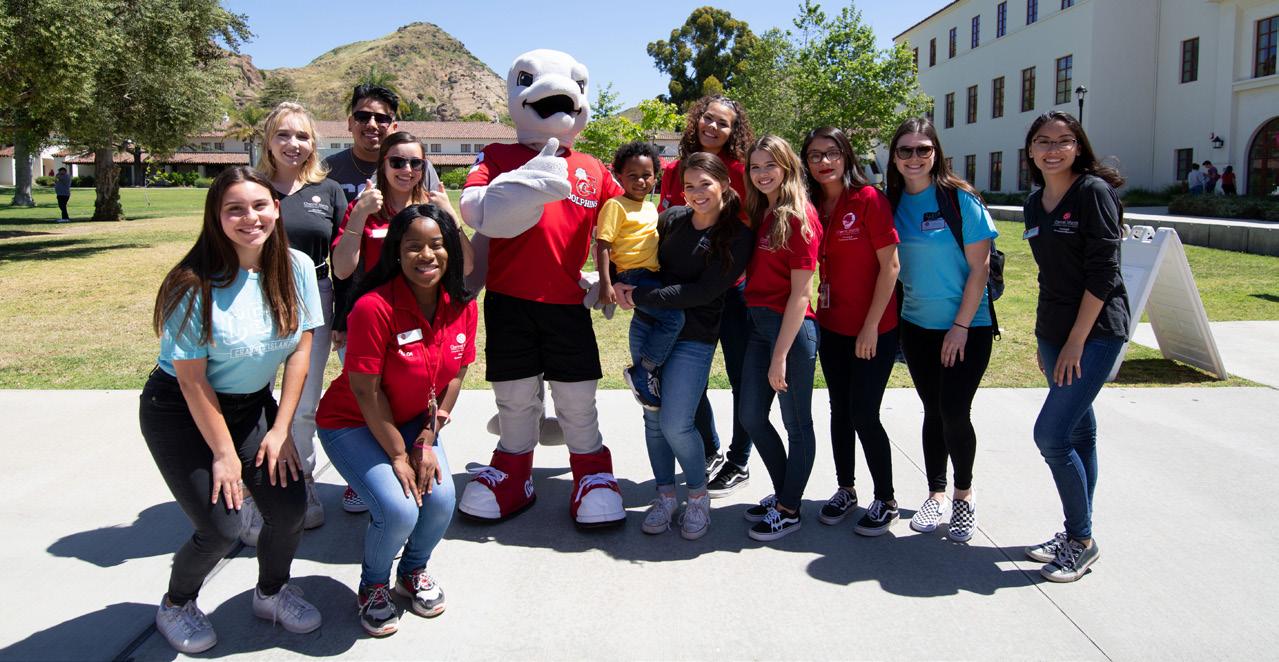
CSUCI recognizes the challenges in the onboarding process, especially for firstyear students, and is actively working on developing a robust First Year Experience (FYE) to enhance student success, including recruitment and bridge programs, the application process, admission, financial aid, registration, housing, summer bridge, orientation, Learning Communities, transition programs, and second-year registration. The overarching goal is to create a more intentional onboarding program that familiarizes students with crucial information for academic success, fosters a sense of community, belonging, and connection to resources. The University recognizes that a well-coordinated onboarding program is essential for enhancing students’ overall wellness, ultimately leading to increased academic success and retention.
● The Summer Success Academy (SSA) program, initiated in Summer 2022, provided 80 entering first-year students with an opportunity to complete college-level coursework before their first year and facilitate a successful transition from high school to college.
● The program, a summer bridge initiative, integrated foundational college courses, peer advising, academic advising, and social support. The comprehensive offering, including two, six-unit general education courses, housing, peer mentoring, writing tutoring, and programming, was provided free for students.
CSUCI has focused on improving both its onboarding process and recruitment efforts. The university has expanded its recruitment team’s outreach to high schools and community colleges in multiple counties, including Ventura, Santa Barbara, San Luis Obispo, Los Angeles, Kern, Riverside, San Bernardino, Orange, and San Diego.
Nationally, university enrollment numbers have been declining, with local community colleges reporting a 35-40% enrollment decrease. Intent-to-enroll numbers among transfer students dropped by 15% in Fall 2022. While Spring 2023 applications increased by 8%, there was a 4% decrease in intent-to-enroll and an 11% decline in enrollment. First-time freshman application numbers increased by 20% for Fall 2022, but intent-to-enroll stages stabilized headcount compared to the previous year. Despite a 5% increase in intent-to-enroll for Fall 2022 compared to 2021, data suggests a decrease in first-time freshman applications in the coming years, with an anticipated increase in the 2025 application cycle.
CSUCI is addressing enrollment recovery through a multi-year approach built around three main pillars:
1
Launching a strategic Integrated Marketing Communication Plan to enhance its reputation through visual rebranding and marketing materials.
2
Revamping admissions and enrollment management operations based on recommendations from an outside firm.
3
CSUCI adopted a more efficient student-facing communication approach that has resulted in students receiving the same information from one office with one voice and without repetition. Both guided registration and learning communities have been incorporated into new student orientation. We anticipate that next year, new student orientation will leverage Learning Communities’ embedded peer mentors to serve as orientation leaders.
The New Student Onboarding process also includes student clubs and organizations that are invited to table at Resource Fairs following New Student Convocation. Finally, for incoming students who seek a summer bridge opportunity, CSUCI transitioned from Early Start to the Summer Success Academy in 2022.
The University recognizes that a well-coordinated onboarding program is essential for enhancing students’ sense of community, belonging, and connection to people and resources, ultimately leading to increased academic success and retention.
Significantly expanding out academic programs.
Data-dive mini-sessions with CSUCI’s Institutional Research office to review dashboard data and explore use of data for regional transfer initiatives ... proved critical for alignment with our regional and state partners.
To strengthen our transfer student pipeline and improve upon the transfer student experience, CSUCI hosted an annual Regional Transfer Success Summit, gathering more than 500 practitioners from across the region and state to highlight transfer student innovations and share insights on best practices for improving the experience of the region’s transfer students.
Data-dive mini-sessions with CSUCI’s Institutional Research office to review dashboard data and explore use of data for regional transfer initiatives (e.g. admissions, enrollment, course-taking patterns, retention and graduation rates, and student engagement), proved critical for alignment with our regional and state partners.
In Summer of 2022, a memorandum of understanding focused on data collection and sharing was developed with Oxnard College. The purpose of this agreement was to facilitate the analysis and sharing of aggregate student data about students who transferred to CSUCI from Oxnard College. The overall goal of this collaboration was to support transfer success, degree completion, and track job placement data after completion of a degree. Each campus will provide one another with access to dashboard data through each institution’s Research Offices. The data will be used for conducting studies and to assist with the development of interventions to increase transfer success, retention, and degree completion. The Institutional Research Offices at OC and CSUCI plan to meet at least once per year to review dashboard data and identify data needs to evaluate transfer success, completion success, and job placement after leaving CSUCI.
These dashboards will include:
Application, admission, and acceptance trends
Enrollment trends and course taking patterns Success metrics such as retention and graduation Postgraduate employment and graduate degree trends
This work will generate similar agreements with other regional colleges.
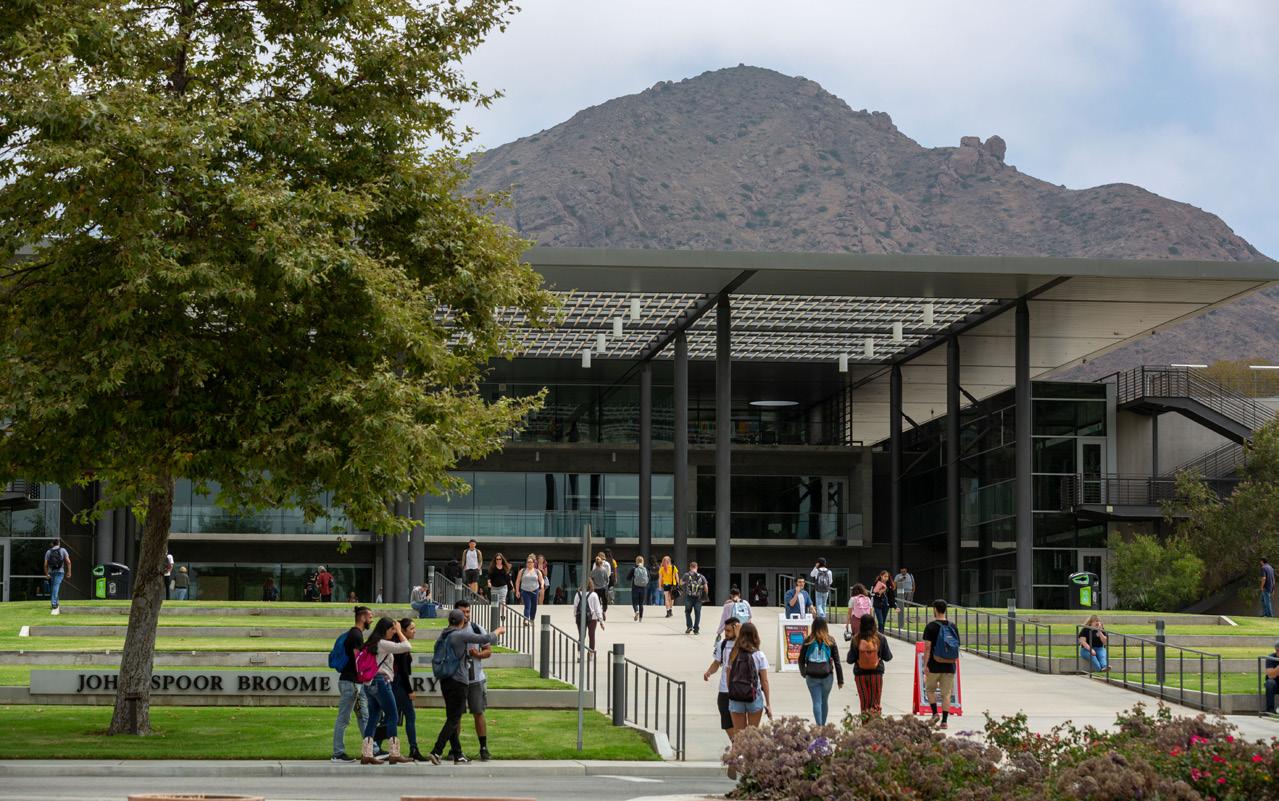
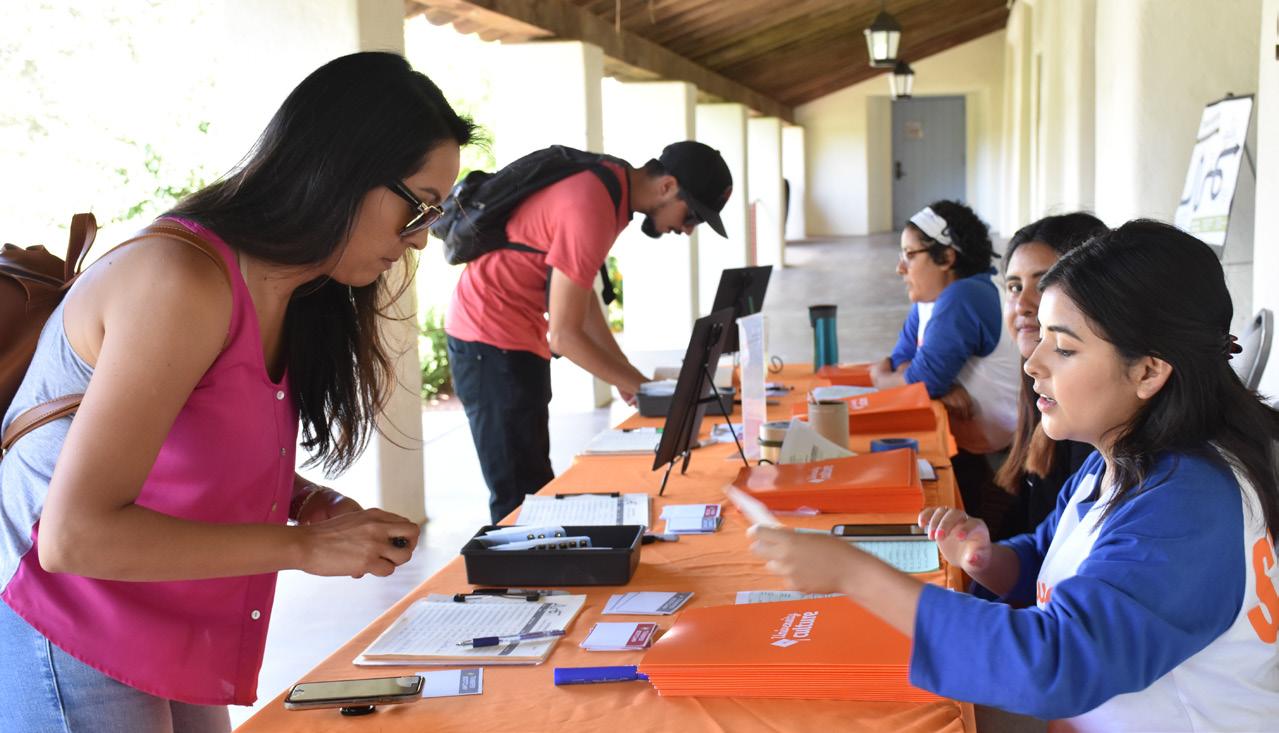
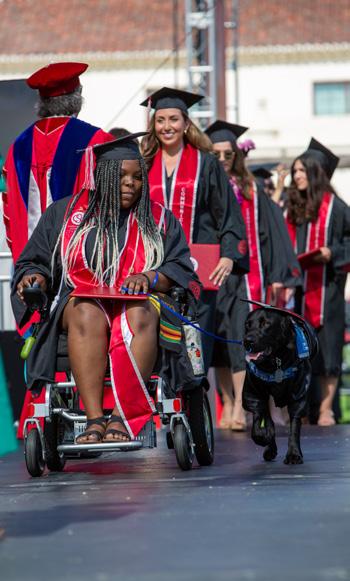
● Efforts to advance DEIA have been underway since CSUCI’s earliest years through a variety of faculty-led grassroots efforts. The campus’s growing maturity in DEIA is an exemplar of shared governance with University leadership institutionalizing previously faculty-and staff-led efforts to grapple with DEIA gaps.
● Development of the Inclusive Excellence Action Plan (IEAP) Framework in January 2021 sought to bring this plethora of racial- and social-justice oriented intentions, recommendations, and commitments into actionable focus. CSUCI is focusing on initiatives resulting from this work for this priority.
● Efforts to expand Ethnic Studies have been a priority, with the establishment of programs like Native American and Indigenous Studies and the formation of an Ethnic Studies Council to guide these developments.
● The expansion of cultural affinity centers has been a priority as well. In Fall 2023, CSUCI celebrated the grand opening of the LatinX and Black Cultural Centers and the Social Justice & Inclusion Center which coordinated with the launch of Chicano/a Studies and Africana Studies programs.

● CSUCI continues to expand DEIA professional development opportunities for faculty around teaching and learning as well as for staff and administrators, such as Faculty Development; Teaching & Learning Innovations; CSU Learn, and mission-based centers.
● Leveraging initiatives like the President’s Advisory Council on Inclusive Excellence (PACIE) and the Inclusive Excellence Action Plan (IEAP), President Richard Yao has worked to put DEIA principles into action across campus. This includes providing workshops for senior leadership on disability awareness, creating frameworks to assess DEIA progress, establishing new roles like the Provost’s Faculty Liaison to Disability Accommodations and Support Services, and running awareness campaigns on disabilities.
● The PACIE, established in 2017, advises the President on inclusive excellence matters, with a focus on promoting equity and justice throughout the university. It has developed tools like the Equity Lens Framework to assess DEIA progress across various dimensions. Additionally, CSUCI has implemented the Inclusive Excellence Action Plan to institutionalize DEIA values and initiatives, with a focus on areas like professional development, workforce diversity, and community relations.
Leveraging initiatives like the President’s Advisory Council on Inclusive Excellence (PACIE) and the Inclusive Excellence Action Plan (IEAP), President Richard Yao has worked to put DEIA principles into action across campus.
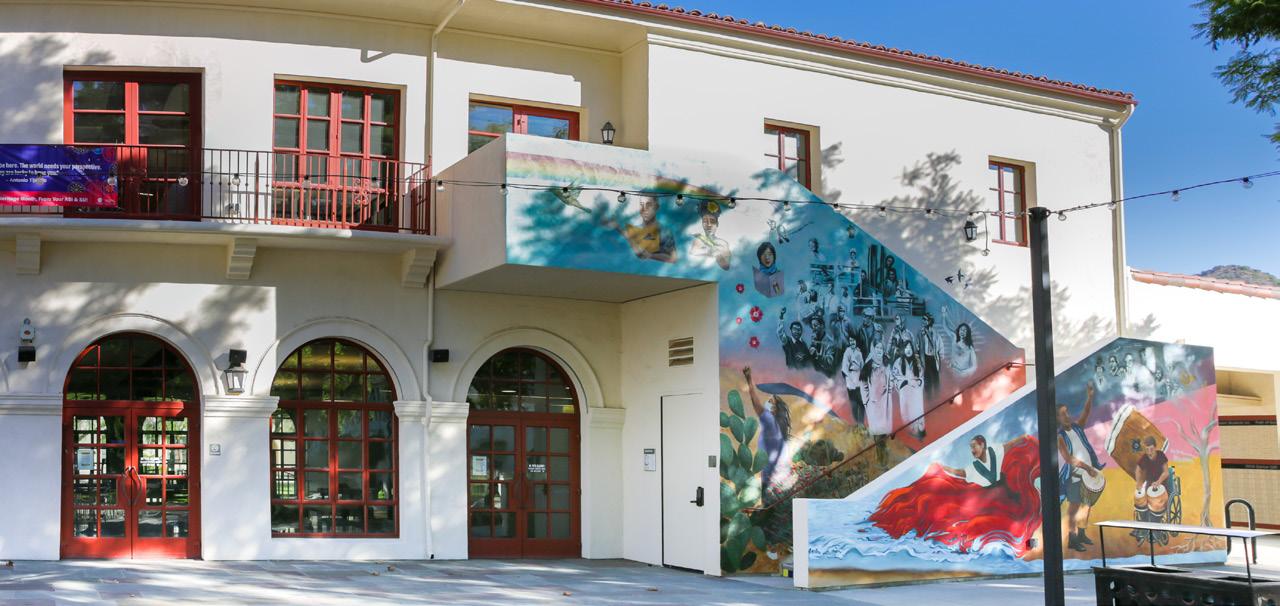
CSUCI’s future work is focused on:
1 2 3 1 2 3
Embracing and enhancing CSUCI’s distinctive identity, and communicating it clearly to internal and community constituencies, via a new, comprehensive strategic plan.
Anchoring a university-wide student success strategic plan with the newly developed and approved student success framework.
Reinforcing and sustaining a campus climate that nurtures a healthy sense of belonging at the university, particularly within all academic programs with an eye towards advancing ethnic studies, place-based experiential learning opportunities, and transitional DEIA projects.
Embracing and Enhancing
CSUCI’s 2030+ Strategic Plan Realizing the distinctiveness of CSUCI’s unique identity across divisions
Embracing and Enhancing
The work of CSUCI’s administrative leaders, faculty and staff going forward will highlight the University’s:
Identity as the ancestral land of the Barbareño Ventureño Band of Chumash Indians and home to sat’wiwa, a Chumash mountain shrine on the CSUCI campus.
Location in the heart of the nation’s 11th largest county in crop value.
Interdisciplinary engagement in coastal health and ocean affairs.
Proximity to one of the biggest independent biotech firms in the world.
Status as one of only 11 universities in the country with a research station on National Park Service land, with opportunities for extensive, interdisciplinary engagement by faculty and staff with the Santa Rosa Island Research Station and the Channel Islands National Marine Sanctuary.
Future home for the Santa Barbara Zoo Conservation Center, the first zoo-owned and managed facility accredited by the Association of Zoos and Aquariums on a university campus
Proximity to the heart of the nation’s entertainment industry – one of the main global hubs for the industry.
Eastern border framed by the Santa Monica Mountains
Commitments to interdisciplinarity, multicultural and international perspectives, community engagement and service learning – with each of these pillars given meanings, opportunities, and partnerships unique to our region, in the diverse and closely-woven communities of Ventura and Santa Barbara Counties.
Expanding enrollment is a key element of the University’s strategic plan. The first two of three phases for CSUCI’s Integrated Marketing Communication (IMC) Plan were accomplished from 2021-23. In 2021-22, ADV Marketing Research & Consulting conducted market research on CSUCI brand perception with broad engagement from students, staff, faculty, and administrators as well as with external partners and stakeholders.
In 2022-23, the University contracted with Beacon Technologies to conduct a web audit, and again with ADV to develop a new Brand Foundation. Phase III is underway in 2023-24 and will continue through 2024-25, involving visual rebranding and a website redesign. Of note, the updated academic master plan represents a critical piece of the University’s long-term enrollment management strategy with the ultimate goal of better meeting the needs of the region while simultaneously driving enrollment growth. Essential to this effort is a strategic enrollment
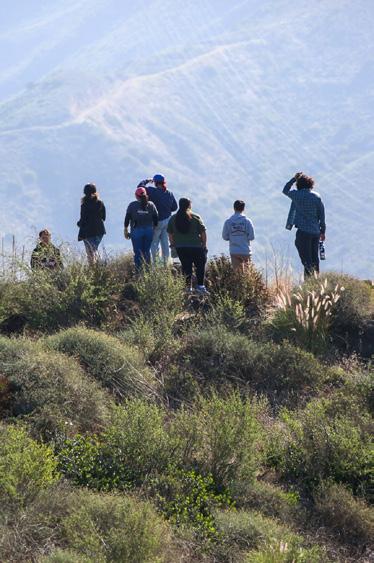

management plan that highlights and utilizes CSUCI’s status as a Seal of Excelenciarecognized Hispanic Serving Institution (HSI) to ensure institutional commitment to impactful, student-centered “servingness”– a multidimensional and conceptual way to move from simply enrolling Latinx students to actually serving them.
Moreover, CSUCI plans to intentionally expand its focus from HSI to Minority Serving Institution (MSI), serving African American/Black and Asian American, Pacifier Island and Native American students in our region.
The third strategic element to Objective 1 is the campus Academic Master Plan which was approved in 2022-2023 by the CSU Board of Trustees (BOT). To meet the challenge of successfully planning to launch multiple new academic programs, academic leadership began by working within the shared governance structure on three key areas:
● Clarifying respective roles and responsibilities for faculty authors and proposers, the Academic Senate and its committees, and administration.
● Developing criteria for prioritizing program launch dates. The four criteria are: 1 2 3 4
Contribution to the emerging unique vision and distinct educational mission of CSUCI.
Potential contribution to enrollment growth.
Financial sustainability and resource requirements.
Internal and external constituency support and resistance.
● Creating and utilizing a robust cost model to project costs. This was the first time the campus engaged in this planning work and it was achieved through regular consultation between the Chief Academic Budget Officer, the Chief Financial Officer, Provost, and President.
The launch dates for the remaining degrees on the AMP are being prioritized, creating a queue beginning in Fall 2025 through 2030. This planning queue will include multiple enrollment scenarios, target dates for new tenure track hires, and other resource requirements such as space and equipment, with both enrollment and fiscal milestones. While this will be a live document, subject to regular revision and updating, it is anticipated to serve as a cornerstone of planning through at least 2030.
Finally, within this objective, CSUCI will work towards institutionalization and strengthening of proved co-curricular programs (i.e., ones determined to be proficient or nearly proficiency through the TPR self study) such as guided registration, the Learning & Living Learning Communities program, Data Champions, CIMAS, transfer student success efforts, and First Year Math, and move towards policy development or change required to sustain those efforts.
The adoption of a university-wide concept of student success at CSUCI is a major win. Next steps involve the development of a detailed student success strategic plan based on the foundation of that framework. Discussions about the roles that various constituencies play in the student experience at CSUCI and how to best support students to pursue their goals are needed. The institution needs to empower and support faculty to address disparities in student achievement.
Given the whole-person framework the university adopted, the burgeoning culture of assessment at CSUCI will be strengthened in and beyond the Division of Academic Affairs (DAA). All divisions need to collect and utilize data to understand and improve retention rates and persistence rates, eliminate equity gaps, and remove administrative barriers, as well as move to include benchmarks beyond graduation and retention rates to measure success. The institution’s goal is that students persist, graduate, feel supported as students, and perform well after graduation. Therefore, additional effort to improve and expand postgraduate outcomes are required. This will be accomplished by aligning academic programs’ continuous improvement efforts to outcomes data more effectively. CSUCI will examine the impact of students’ engagement in high-impact practices during their undergraduate experiences on post-graduate outcomes.
CSUCI will work towards institutionalization and strengthening of proved co-curricular programs.
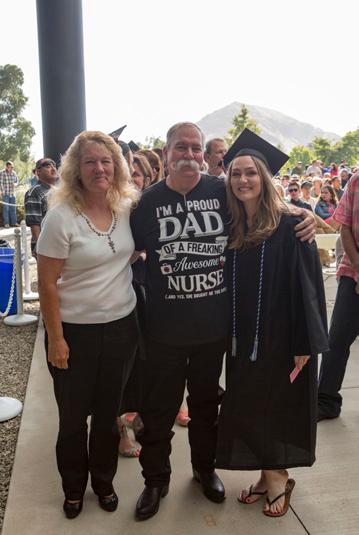

The vision is to create and sustain a widespread culture of recruitment, enrollment, and retention across campus so that we can reach our GI 2025 goals of 94% student retention from fall to spring and 76% retention from spring to fall.
Incorporated into the student success strategic plan will be details regarding the expansion of academic roadmaps to include high-impact practices, student access to the Basic Needs Program and wellness services such as Counseling & Psychological Services and Student Health Services. Further, the university will develop and communicate a menu of place-based experiential learning opportunities available to CSUCI students, using it to promote current student engagement and retention efforts and to market our distinctive identity to prospective students. The planned improvements to the New Student Onboarding processes for cross-divisional services and operations will also factor into this plan. CSUCI has pre/orientation programs, learning communities, embedded high-impact practices, and academic advising activities during the first year of student onboarding, and will better integrate them to improve our First Year Experience (FYE) approach, particularly given that our student population is comprised of a large number of first generation, Pell-eligible, and historically underrepresented students. We have developed a timeline of current new student onboarding and signature events that will guide continued planning.
The vision is to create and sustain a widespread culture of recruitment, enrollment, and retention across campus so that we can reach our GI 2025 goals of 94% student retention from fall to spring and 76% retention from spring to fall.
The campus proposes three overarching goals:
Reduce fragmented approach to new student onboarding for full-time, firsttime and transfers.
1 2 3
Develop culturally relevant onboarding experience.
Leverage new student onboarding to cultivate students’ academic identity.

Significant investment will be made in equity and inclusion initiatives. CSUCI will continue to invest in and assess initiatives of the Inclusive Excellence Action Plan (IEAP), monitoring for accountability and outcomes, revising as needed to ensure continuous growth in realizing DEIA values, and publishing updates to the campus community in each of the six Inclusive Excellence Action Themes. The institution is developing and making widely available dashboards to track attempts and outcomes of students taking ethnic studies courses, along with specific data regarding how and when in their academic career students complete the newly instituted Ethnic Studies General Education requirement. A steady focus on the progress for the development of existing and planned ethnic studies programs is also required. This means moving towards clear-cut understandings about the role of the Ethnic Studies Council, collaboration between faculty and the student cultural affinity centers, and successfully hiring and retaining faculty and staff to support these efforts.
CSUCI will provide support to increase students’ sense of connection within their major and to learn general and discipline-specific career readiness skills. For example, CSUCI aims to build students’ sense of academic efficacy and motivation within their academic disciplines; increase students’ sense of connection to the University and sense of belonging in college; deepen students’ sense of preparedness for the workforce as “first-generation professionals;” and increase students’ knowledge, skills, and experiences necessary for engaged citizenship and career success. Starting in Spring 2024, students’ sense of belonging will be regularly benchmarked by an in-house developed survey.
CSUCI aims to build students’ sense of academic efficacy and motivation within their academic disciplines; increase students’ sense of connection to the University and sense of belonging in college; deepen students’ sense of preparedness for the workforce as “first-generation professionals;” and increase students’ knowledge, skills, and experiences necessary for engaged citizenship and career success.
CSUCI will provide support to increase students’ sense of connection within their major and to learn general and discipline-specific career readiness skills.
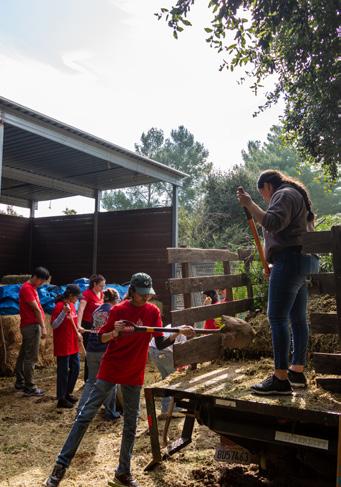
Division of Academic Affairs
Contact accreditation@csuci.edu with questions or comments.


If you want to do more:
SUPPORT students through giving INFLUENCE connections to expand resources
FOSTER possibilities for academic research and CELEBRATE friends at university events
Designed by Irene Hoffman